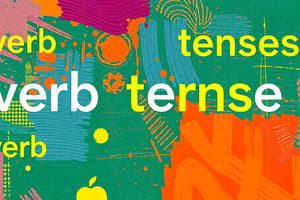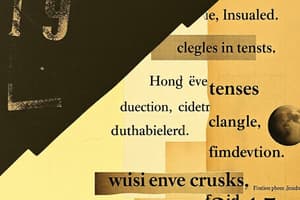Podcast
Questions and Answers
The simple present tense indicates actions that are ongoing.
The simple present tense indicates actions that are ongoing.
False (B)
The present perfect continuous tense describes actions that started in the past and continue into the present.
The present perfect continuous tense describes actions that started in the past and continue into the present.
True (A)
The past perfect tense describes actions that are expected to occur in the future.
The past perfect tense describes actions that are expected to occur in the future.
False (B)
In the future continuous tense, actions are described as happening at a specific point in the future.
In the future continuous tense, actions are described as happening at a specific point in the future.
The aspect of a tense refers to how an action is expressed in relation to time.
The aspect of a tense refers to how an action is expressed in relation to time.
The simple future tense expresses actions completed before a specified future time.
The simple future tense expresses actions completed before a specified future time.
The past continuous tense describes actions that were happening at a specific time in the past.
The past continuous tense describes actions that were happening at a specific time in the past.
Present perfect tense indicates actions happening right now.
Present perfect tense indicates actions happening right now.
Flashcards are hidden until you start studying
Study Notes
Overview of Tenses
- Definition: Tenses indicate the time of action or state of being in relation to the moment of speaking.
Types of Tenses
-
Present Tense
- Simple Present: Describes habitual actions or universal truths.
- Example: She walks to school.
- Present Continuous: Describes actions happening now or ongoing.
- Example: She is walking to school.
- Present Perfect: Describes actions completed at some point in the past but relevant to the present.
- Example: She has walked to school.
- Present Perfect Continuous: Describes actions that began in the past and continue to the present.
- Example: She has been walking to school.
- Simple Present: Describes habitual actions or universal truths.
-
Past Tense
- Simple Past: Describes actions completed in the past.
- Example: She walked to school.
- Past Continuous: Describes actions that were ongoing in the past.
- Example: She was walking to school.
- Past Perfect: Describes actions that were completed before another action in the past.
- Example: She had walked to school.
- Past Perfect Continuous: Describes actions that were ongoing in the past up until another past action.
- Example: She had been walking to school.
- Simple Past: Describes actions completed in the past.
-
Future Tense
- Simple Future: Describes actions that will happen in the future.
- Example: She will walk to school.
- Future Continuous: Describes actions that will be ongoing at a certain point in the future.
- Example: She will be walking to school.
- Future Perfect: Describes actions that will be completed before a specified future time.
- Example: She will have walked to school.
- Future Perfect Continuous: Describes actions that will have been ongoing up until a specified future time.
- Example: She will have been walking to school.
- Simple Future: Describes actions that will happen in the future.
Key Concepts
-
Aspect: Refers to the way an action is expressed in relation to time. Main aspects include:
- Perfect: Indicates completion.
- Continuous: Indicates an ongoing action.
-
Use of Tenses:
- To convey time: Indicates when an action occurs.
- To express duration: Shows how long an action continues.
- To indicate frequency: Describes how often an action occurs.
Summary
Understanding tenses is crucial for effective communication as they provide context regarding when actions take place, their duration, and their relevance to other actions.
Overview of Tenses
- Tenses signify the timing of actions or states of being in relation to the present moment.
Types of Tenses
-
Present Tense
- Simple Present: Used for habitual actions or universal truths (e.g., "She walks to school").
- Present Continuous: Indicates actions occurring right now or in progress (e.g., "She is walking to school").
- Present Perfect: Describes completed actions with relevance to the present (e.g., "She has walked to school").
- Present Perfect Continuous: Actions that started in the past and continue up to now (e.g., "She has been walking to school").
-
Past Tense
- Simple Past: Refers to actions completed in the past (e.g., "She walked to school").
- Past Continuous: Denotes actions that were ongoing in the past (e.g., "She was walking to school").
- Past Perfect: Represents actions finished before another past action (e.g., "She had walked to school").
- Past Perfect Continuous: Describes actions ongoing in the past until another past action occurred (e.g., "She had been walking to school").
-
Future Tense
- Simple Future: For actions expected to happen in the future (e.g., "She will walk to school").
- Future Continuous: Actions that will be ongoing at a specified future time (e.g., "She will be walking to school").
- Future Perfect: Actions that will be completed before a certain point in the future (e.g., "She will have walked to school").
- Future Perfect Continuous: Actions that will have been ongoing up until a future time (e.g., "She will have been walking to school").
Key Concepts
- Aspect: Describes how action is represented in time:
- Perfect Aspect: Indicates completion of tasks.
- Continuous Aspect: Highlights ongoing actions.
- Use of Tenses:
- To convey time: Denotes when actions occur.
- To express duration: Illustrates how long actions last.
- To indicate frequency: Details how often actions happen.
Summary
- Mastering tenses enhances effective communication by providing clear context about timing, duration, and relation of actions.
Studying That Suits You
Use AI to generate personalized quizzes and flashcards to suit your learning preferences.



